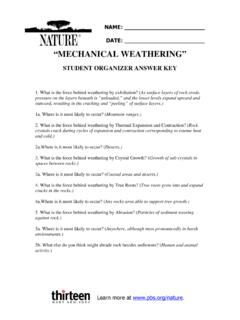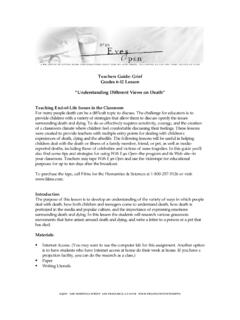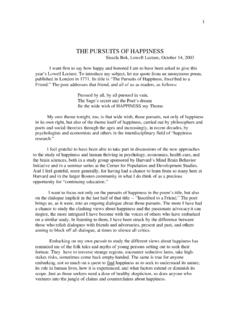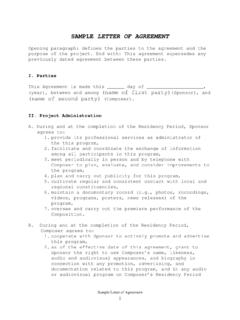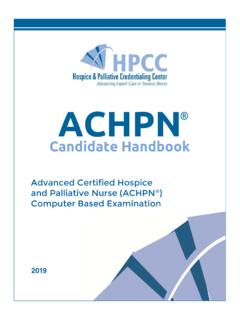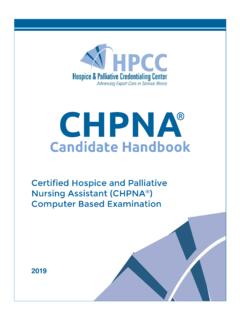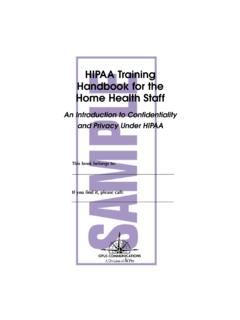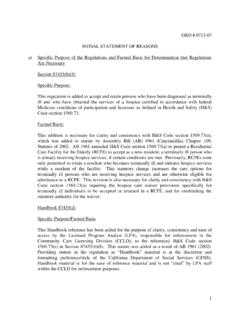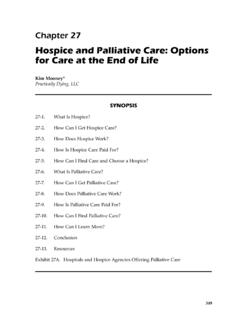Transcription of Home Care - PBS: Public Broadcasting Service
1 Situations can prompt the need for home care services for an elder in your family: Medical emergency: My mother fell and broke her hip. She was in the hospital and in a rehab center. Now it s time for her to come home , but she can t manage by herself and still needs physical therapy. What should I do?Changes in a chronic illness: My dad has Parkinson s. He gets easily confused, can no longer drive, and has a hard time cooking for himself. I m increasingly afraid to leave him alone while I m at work during the day. What should I do?Natural aging process: My parents are lucky to be healthy and fairly active, but they are both in their early 8Os, and it s getting harder and harder for them to get groceries and keep up their house and yard.
2 They want to remain in their home . What should I do? The goal of home care services is to allow elders to remain at home and to maximize their ability to be independent without jeopardizing their safety. The term aging in place has become a catchphrase for describing this goal, and there is increasing support among health care professionals and policy makers for keeping elders in their communities with appropriate services. Many elders need only a small number of services to function independently at home , such as help with home repair, cleaning, and cooking. However, with hospitals and rehab centers shortening the length of patient stays, some elders need a fairly high level of home health care services, either for a limited period of time following an illness or accident, or as ongoing care to manage decreased abilities or a chronic health condition.
3 What Is home care ? home care services fall into five general categories, although some home care agencies may offer multiple services and have more than one Service provided by the same person from their agency. Homemaker Services1 provide home management assistance, such as grocery shopping, light housekeeping, laundry, and changing beds. Personal care Services2 provide assistance with daily routines, such as bathing, dressing, grooming, eating, using the bathroom, and getting around. Meal Services3 provide meals to seniors either in their own homes ( Meals on Wheels ) or in senior centers, churches, synagogues, schools, and other community locations ( Congregate Meal Programs ). home Care43 home Health care Services4 assist people with health and medical conditions that are being treated at home .
4 home health aides will assist with basic health care such as taking vital signs (temperature and pulse), changing bandages and dressings, and assisting with medications. Skilled Health care Services5 provide registered nurses, licensed practical nurses, and physical, occupational, and speech therapists who give skilled nursing care and rehabilitative therapies at home . Medicare will pay for short-term home care when skilled services are needed, usually following surgery or acute care stay in a hospital. For more information, see the Health care and Insurance Is home care Needed?Getting a care assessment is the best way to determine when an elder needs home care services. Caregivers can do it by themselves or get help with the process by calling their Area Agency on Aging (AAA) or a geriatric care of Daily Living (ADL)An assessment is based on different kinds of information, starting with your elder s ability to manage ADLs.
5 These are the basic tasks involved in personal care and household work. See the Checklist of Activities of Daily Living (ADL) to help you determine what assistance is needed. The checklist can help you answer questions about physical limitations and memory problems affecting an elder s ability to:Do housework, laundry, shopping, and cooking Maintain personal care , such as bathing, dressing, and using the bathroom Manage medical appointments and medications Handle personal finances and legal issues Filling in the checklist before calling your AAA or a home care agency will make the conversation more useful and productive, so that you can move ahead with home care decisions. Physical Health ConsiderationsPlanning for home care also involves an assessment of health issues affecting both physical and mental health.
6 Caregivers may want to consult with the elder s primary care physician (PCP) or a geriatric specialist to evaluate an elder s physical capacities. Issues to consider include:Mobility: The ability to safely move around one s own home and neighborhood is often compromised with advancing age. For a professional assessment, ask the elder s doctor or get a referral to an occupational therapist. To make your own assessment, you can use a tool home CAre44developed by the Society of Hospital Medicine at : Vision impairment is common among the elderly and often leads to reduced social interaction and quality of life, depression, and injuries from falls. But since elders often do not report their vision problems to their health care providers, vision screening is recommended.
7 Treatment for many vision problems common in older adults, such as cataracts and refractive errors, is available and can greatly improve quality of : Hearing deficits are also common among older adults and can affect quality of life. Assistive technology, such as hearing aids and cochlear implants, can be used to help basic hearing loss, while more serious conditions may require specialized medical attention. mental Health ConsiderationsAssessing the mental health of the elder in your care can be challenging. The line between memory problems that naturally occur with aging and memory problems that occur in the early stages of dementia and/or Alzheimer s can sometimes be hard to distinguish. If an elder seems more confused that usual, has trouble completing daily routines, or has difficulty keeping track of daily medications, house keys, and other personal items, these may be signs that some level of cognitive impairment has occurred.
8 The signs of depression are also difficult to sort out; low energy, loss of appetite, and lack of interest in others can have a variety of sources. Getting a geriatric mental health assessment can help you get a clearer picture of what is going on and whether home care is advisable for this reason. For advice on how to get this kind of assessment done, ask your PCP, your local Area Agency on Aging (AAA) or Council on Aging (COA).Nutrition ConsiderationsNutrition can be a major issue for elders remaining at home . Caregivers need to consider several questions about the elder in their care : Is the elder getting the right kinds and amount of food to meet daily health requirements? Is the elder capable of shopping for the right foods and preparing them?
9 Is the elder eating the food he or she prepares or that is prepared for him or her? Healthy eating is a challenge for all of us, and elders may have additional issues that make healthy eating even harder: poor health, difficulty shopping or cooking, food insecurity (hoarding), loneliness, or depression. Malnutrition is one of the primary reasons that many elders can no longer live on their own. If the elder in your care is having difficulty managing proper nutrition, there are meal services CAre45 The Elderly Nutrition Program is a federal- and state-funded program which allows local elder agencies to provide meals, nutrition screening, assessment, health education, and counseling. People age 60 or older and their spouses are eligible.
10 There is no income requirement. A small voluntary donation is requested for those who can afford to pay. Your local senior center or Area Agency on Aging (AAA) can help you locate the appropriate type of meal program. There are two types:The Congregate Meal Program provides at least one meal per day at senior centers, 1 churches, schools, and other locations. The group setting offers many elders an important opportunity for socialization and companionship. Transportation is often available for those who have trouble getting around on their own. Some programs also offer meals on weekends. Meals on Wheels are home -delivered meals of nourishing food for elders who are 2 homebound and not able to prepare their own food. This subsidized home delivery program can also be supplemented with meals purchased through private services.

